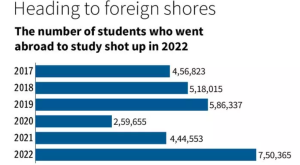5 Private Banks Offering Education Loans for Abroad Studies opens doors to global opportunities, providing financial solutions for students pursuing international education. This exclusive look explores the landscape of private banking, examining their role in facilitating study abroad. We delve into the specific features of these loans, comparing key offerings, and highlighting the application process. Beyond the financial aspects, we also consider the advantages and disadvantages of utilizing private banks, exploring alternative financial aid options, and offering insights into navigating loan agreements.
Understanding the intricate details of these loans, from loan amounts and interest rates to repayment terms, is crucial for prospective international students. We’ll analyze the top 5 private banks specializing in education loans, examining their criteria, and providing a comprehensive overview of their loan offerings. The journey to a global education is made easier with this detailed insight into education loan options from private banks.
Introduction to Private Banks Offering Education Loans

Private banks play a crucial role in facilitating international education by providing tailored financial solutions. They often offer more flexible and personalized loan options compared to traditional government-backed programs, catering to the unique needs of students pursuing studies abroad. This access to capital is vital for students facing the significant financial burdens of international education.Education loans for abroad studies are typically designed with the student’s academic goals in mind.
Key features often include flexible repayment terms, potentially lower interest rates compared to other loans, and tailored options for specific academic programs. These loans often require comprehensive documentation, including proof of admission, program details, and financial stability. Understanding the specific terms and conditions of each loan is critical to making an informed decision.
Advantages of Using Private Banks for Education Loans
Private banks often offer more customized loan packages than government-backed programs. This customization allows for flexibility in repayment schedules and loan amounts, fitting the specific needs of each student. They may also offer potentially lower interest rates and faster processing times.
Disadvantages of Using Private Banks for Education Loans
Private banks might impose stricter eligibility criteria than government-backed options. The loan application process can be more complex, requiring thorough documentation and possibly a longer approval time. Interest rates, while potentially lower in some cases, can still be higher than government loans, and the terms of the agreement must be carefully reviewed.
History of Private Banking’s Involvement in Education Financing
The involvement of private banks in financing international education has grown significantly in recent decades. Early involvement focused on high-net-worth individuals and families seeking funding for their children’s overseas education. Gradually, these institutions expanded their services to cater to a wider range of students and created more comprehensive loan packages, driven by the increasing demand for international education and the rising cost of studying abroad.
This expansion reflects a broader trend of private banks recognizing the significant role they can play in supporting educational aspirations.
Key Terms and Concepts in Education Loans for Abroad Studies
Several key terms and concepts are essential for understanding education loans for abroad studies. These terms often define the conditions and expectations associated with the loan agreements.


